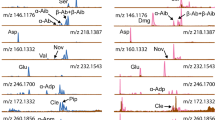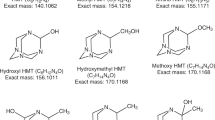Abstract
THE Orgueil meteorite1, a Type I carbonaceous chondrite that fell in France in 1864, has a high carbon content of about 5 per cent. It has been reported to contain several organic compounds, but some of these compounds, notably amino-acids2–4, have been suspected of being terrestrial contaminants4–7. Until recently it has been difficult to determine the extent of the contamination which occurred between the time of fall of a meteorite and its examination in the laboratory. Now, however, the problems of separation of contaminant from indigenous amino-acids in meteorites can be largely overcome by applying gas chromatographic techniques for the separation of D, L enantiomers of amino-acids as their diastereomeric derivatives and the identification of these compounds by gas chromatographic retention times and mass spectral fragmentation patterns. This kind of approach has been used in investigations of the amino-acids in the Murchison and Murray meteorites8–11. Because terrestrial, biogenic amino-acids are commonly of the L configuration, the presence in these meteorites of racemic mixtures of D, L amino-acids suggested a nonbiogenic origin for these compounds. In addition, the presence of amino-acids not commonly found in protein also strongly implied an extraterrestrial, abiotic origin.
This is a preview of subscription content, access via your institution
Access options
Subscribe to this journal
Receive 51 print issues and online access
$199.00 per year
only $3.90 per issue
Buy this article
- Purchase on Springer Link
- Instant access to full article PDF
Prices may be subject to local taxes which are calculated during checkout
Similar content being viewed by others
References
Baker, B. L., Space Life Sci., 2, 472 (1971).
Kaplan, I. R., Degens, E. T., and Reuter, J. H., Geochim. Cosmochim. Acta, 27, 805 (1963).
Anders, E., DuFresne, E. R., Hayatsu, R., Cavaille, A., DuFresne, A., and Fitch, F. W., Science, 146, 1157 (1964).
Oro, J., Nakaparksin, S., Lichtenstein, H., and Gil-Av, E., Nature, 230, 107 (1971).
Oro, J., and Skewes, H. B., Nature, 207, 1042 (1965).
Vallentyne, J. R., in Origins of Prebiological Systems (edit. by Fox, S. W.), 105 (Academic Press, New York, 1965).
Hamilton, P. B., Nature, 205, 284 (1965).
Kvenvolden, K., Lawless, J., Pering, K., Peterson, E., Flores, J., Ponnamperuma, C., Kaplan, I. R., and Moore, C., Nature, 228, 923 (1970).
Kvenvolden, K. A., Lawless, J. G., and Ponnamperuma, C., Proc. US Nat. Acad. Sci., 68, 486 (1971).
Oro, J., Gibert, J., Lichtenstein, H., Wikstrom, S., and Flory, D. A., Nature, 230, 105 (1971).
Lawless, J. G., Kvenvolden, K. A., Peterson, E., and Ponnamperuma, C., Science, 173, 626 (1971).
Author information
Authors and Affiliations
Rights and permissions
About this article
Cite this article
LAWLESS, J., KVENVOLDEN, K., PETERSON, E. et al. Physical Sciences: Evidence for Amino-acids of Extraterrestrial Origin in the Orgueil Meteorite. Nature 236, 66–67 (1972). https://doi.org/10.1038/236066a0
Received:
Issue Date:
DOI: https://doi.org/10.1038/236066a0
Comments
By submitting a comment you agree to abide by our Terms and Community Guidelines. If you find something abusive or that does not comply with our terms or guidelines please flag it as inappropriate.



